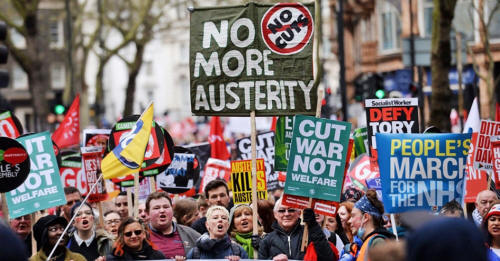|
from CommonDreams Website
in central London in April 2016 drew thousands. But what, the elites wonder, are they all so angry about?
(Photograph: Stefan Rousseau/PA)
In January, at the annual World Economic Forum in Davos, Switzerland - largely a meeting of corporate elites and political leaders - the billionaire CEO Steve Schwarzman courteously granted an interview to Bloomberg Television.
When asked about the American political scene, Schwarzman responded just as many of his colleagues have:
After Donald Trump became the presumptive Republican presidential nominee, and after citizens of the United Kingdom voted to leave the European Union, commentators and elites alike have taken Schwarzman's recommendation to heart.
They have ventured to find out precisely what's going on.
Following a combination of backward-looking and introspection, the view that has come out on the other end has often been striking:
The people, the masses, driven by irrational fears and overblown anxieties, are exercising their reactionary impulses and using their influence to take a sledgehammer to the system.
Historically, conclusions of this kind are nothing new.
In response to populist upheaval and democratic movements from below, the elites always attempt to muster a response to at once explain the discontent and quash the resulting backlash.
This year, however, has been unique in many ways, one of them being the boldness with which elites have asserted not just their right to rule, but their sense of moral obligation.
And this boldness, as Bloomberg's interview with Steve Schwarzman makes clear, has come tinted with a profound disregard for the circumstances experienced by working men and women across the globe.
Reviving the contempt for the public famously expressed by such figures as John Adams ("the mob") and his son, John Quincy Adams ("the rabble") - as well as the reverence for elites expressed by influential characters from Plato to Walter Lippmann - Traub insists that it,
But while it is cloaked in the garb of objectivity, Traub's insistence that elites "rise up" is little more than the latest edition of, in the words of conservative commentator Ross Douthat,
Traub urges us to recognize the growing gulf between those who acknowledge reality and those who don't, those who care about facts and those who toss them aside in the name of political gain.
But what Traub doesn't seem to recognize is that elites, by selling the public false goods for decades, helped spark the rise of racist demagogues like Donald Trump, Marine Le Pen, and others.
The masses, for their part, are always there to pick up the costs.
And they're sick of it.
Traub and others are correct to deplore the anti-immigrant sentiment preyed upon by loud-mouthed bullies, and they are justified in their fears that populist anger could result in the election of charlatans like Donald Trump, both in the United States and throughout Europe.
They cannot be forgiven, however, for the key roles they played in creating the disasters - economic, political, and military - to which the masses are now responding.
And they cannot be forgiven for ignoring the consequences of their actions by blaming an excess of democracy, rather than a lack of it, for global upheaval.
Elites, by forcefully eliminating avenues for democratic progress, have cultivated the environment in which anti-establishment sentiment now thrives.
And the major political parties of the wealthiest nations on earth, in order to curry favor from big business, have pushed aside the needs of the working class, often disregarding workers as racists unworthy of attention.
And the punditry has dutifully followed suit.
For example, in an appearance on Slate's Political Gabfest, NPR's Adam Davidson casually floated his contempt for working people while simultaneously lavishing praise upon Hillary Clinton's economic advisers.
This flippant dismissal of a significant portion of the labor force - particularly those without a college degree - is characteristic of elite disdain for "the rabble," those who would dare think they deserve a dignified existence in a globalized, technologically advanced economy.
Thus the view of Pennsylvania Republican Michael Korns has become commonplace.
Out of this dilemma, elitists like Traub have created a false dichotomy:
Ignored, of course, is the agenda of social democracy put forward by figures like Bernie Sanders, whose policies, in many cases, terrify elites more than the explicit racism and unpredictability of Trump.
So elites have framed the picture as one portraying a stark choice:
It is no wonder, then, that many are siding with the former - people recognize that it is elites who have designed the system that has been so devastating for so many.
This is, as Josh Bivens has documented, true of the economic system as a whole: It was designed to fail - at least for the majority.
Meanwhile, the wealthiest have thrived, particularly in the United States, where they have seen their incomes grow by over 300 percent while everyone else's have stagnated:
This has fed the perception among Americans and Europeans that their influence on the direction of their nations - both economically and politically - has dwindled, and perhaps disappeared entirely.
The problem for elites attempting to counter this perception is, of course, that it's accurate.
As the political scientists Martin Gilens and Benjamin Page have shown,
The result is mass disaffection, sometimes resulting in anger, and sometimes, apathy.
Who can blame them? And who can blame those who long to thwart the political and corporate leaders who continue to peddle politics and economics as usual?
Until elites come to recognize the fact that the system they have cultivated - the system that has allowed them to thrive at the expense of everyone else - has helped to foster the kind of resentment they are now desperately attempting to suppress, they will continue to be the target of those whose material circumstances have become unbearable, in large part due to the global economic order.
But in all likelihood, they will not recognize this fact.
As Upton Sinclair used to say,
|


